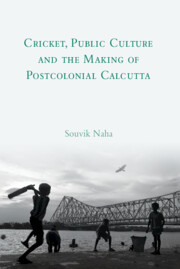Book contents
- Frontmatter
- Dedication
- Contents
- Acknowledgements
- List of Abbreviations
- Introduction
- 1 Cricket, Syndicated Englishness and Postcolonialism
- 2 Narratives of Cricket and Collective History
- 3 The Making of a City of Cricket
- 4 Politicians, Patronage and Centre–State Relations
- 5 Spectators, Gender and Public Space
- 6 The Moral Economy of Violent ‘Gentlemen’
- Conclusion
- Select Bibliography
- Index
2 - Narratives of Cricket and Collective History
Published online by Cambridge University Press: 23 November 2022
- Frontmatter
- Dedication
- Contents
- Acknowledgements
- List of Abbreviations
- Introduction
- 1 Cricket, Syndicated Englishness and Postcolonialism
- 2 Narratives of Cricket and Collective History
- 3 The Making of a City of Cricket
- 4 Politicians, Patronage and Centre–State Relations
- 5 Spectators, Gender and Public Space
- 6 The Moral Economy of Violent ‘Gentlemen’
- Conclusion
- Select Bibliography
- Index
Summary
The leisurely nature of Test cricket once made American comedian Groucho Marx remark, while watching England play during a trip to London in 1954, ‘What a wonderful cure for insomnia. If you can’t sleep here, you really need an analyst.’ Soviet tennis star Alex Metreveli once told journalist Moti Nandi that cricket was a tedious sport for a passive public. Interestingly, an income-tax officer in Calcutta, who had received a season ticket as a bribe, remarked after a boring day of cricket, ‘It is better to listen to radio commentary or read about cricket in the newspapers than to watch it for five hours.’ Indeed, in the 1950s, cricket journalism in Bengali developed from deadpan match reporting to an imaginative representation of both the play and the spectators. A major challenge for journalists in the 1950s–60s, the decades later criticised for uninspiring and slow play, was to enliven the day’s proceedings to sustain the public’s interest. This new direction in journalism as well as radio commentary nonetheless proved to be highly influential, just as the income-tax officer confessed. Later, the immediacy of radio and television challenged the belated impact of newspapers and magazines. In 1978, a satirical piece in the Khelar Asar addressed the growing apprehension that audio-visual media would change the fabric of journalism and recast the form and content of the knowledge of cricket. Narrating a fictitious meeting, the author articulated through the figure of the organiser that the information in match reports differed greatly from radio commentary, showing awareness of the complexity of representation.
Any history of sport is to a large extent a history of mediatised and mediated sport. The constitutive role of authors and journalists in the emergence of sporting cultures is quite evident, if somewhat underexplored by historians. Sport and the media have shared an intimate bond for more than two centuries. The media has ensured that the twentieth-century public life becomes inconceivable without its componential ‘sports chatter’, a term Umberto Eco coined in his essay on the public dimensions of sport. Eco writes, provocatively, that sport is a creation of the sports press, and ‘at several removes there remains the actual sport, which might as well not even exist’.
- Type
- Chapter
- Information
- Publisher: Cambridge University PressPrint publication year: 2023



